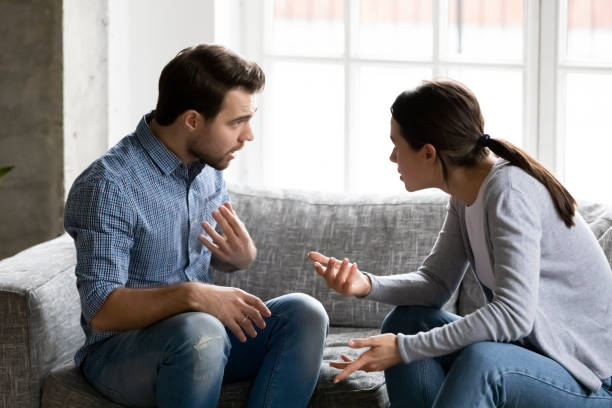Falling in love is beautiful and easy, but staying through to the end from the start to forever needs you to put in some effort.
In the same way babies grow from sitting to crawling, standing to walking, and then running; relationships also have stages. You can’t jump over one phase, it’s a ladder you have to take one step after the other.
Going through the stages of a relationship helps you to make decisions about whether you’ll stay with the person or leave.
Perhaps you want to start your relationship journey or you’re already in one, understanding the stages of relationships will help you stay till the end which is marriage. The stages include attraction, attachment, crises, commitment, and mature or wholehearted love stage.
Are you ready to understand these stages? Let’s dive right in as we unveil what these stages are and how to cope with each stage.
First Stage: The Attraction Stage
The first stage of a relationship is known as the attraction stage. It’s also called the honeymoon or euphoric phase. You can’t fall in love if you’re not attracted to that person. You’re either drawn to the person based on physical appearance, dress sense, common interests, or the way he/she talks. This is the phase where you get to know about each other and first impressions matter a lot during this stage.
The attraction stage is driven by some hormones like oxytocin and dopamine. These hormones steer up joy and energetic feelings in you whenever you’re with that person.
At this initial stage, you feel this person is a match made for you from heaven because everything seems to be sweet and you overlook red flags.
What to do during the Attraction Phase.
Take time to enjoy yourself at this stage because the feeling is temporary and will eventually fade away.
You should also be authentic and be your true self. Let the real person inside you shine as you don’t want the relationship to be founded on lies.
Go out with each other on dates to learn about your hobbies, dislikes, and values. This will help strengthen your bond and nurture emotional connections between you two.
Remember that this stage is more of infatuation and love at first sight, it sets the foundation for the other stages. So, you shouldn’t rush into making commitments and expecting too much from your partner.
Second Stage: Attraction to Attachment
After graduating from the previous stage, there’s the need for a deeper connection which moves you to the next stage, known as the attraction stage. This can still be called the honeymoon stage because you’re transitioning into a deeper emotional connection with your partner.
At this stage, you spend more time together to learn about each other’s likes and dislikes as this will help you in making decisions to either continue with the relationship or back off.
This is when you start forming a deeper connection. You’re spending more time together, learning about each other’s quirks, and building emotional intimacy.
During this phase, the extreme giddiness where fantasies take over your brain has faded off. You start to realize that you both are unique beings with different characters. Mild conflicts might occur due to these differences and you finally start to think there’s no such thing as a perfect match after all.
What to do during the Attachment Stage
This stage is about building trust and getting to know each other better. You should continue to spend time together and make an effort to keep the spark alive. Plan enjoyable activities that strengthen your emotional bond.
While attachment is about deepening the connection, it’s essential to maintain your own identity and interests. You can encourage your partner to do the same.
As power struggles tend to increase during this stage, you should learn to manage conflicts and disagreements through effective open communication.
Third Phase: Crisis Stage
The third relationship stage is often referred to as the “crisis stage.” In this stage, conflicts and challenges are bound to start. This is to test the strength of their bond and is a determining factor for the continuity of the relationship.
During this stage, you need to be open to your partner, telling him/her what you don’t like and sharing your honest feelings. You also tend to discover yourself and recognize that everyone is created uniquely and we all have our flaws.
What to do during the crisis stage.
You shouldn’t push the blame on your partner whenever conflicts arise. Sit down to think how you might have also contributed to the argument and look for ways to resolve it amicably.
If you feel you can’t handle it alone, you can seek the help of a licensed marriage or family therapist. They have the experience to walk you through your relationship challenges.
Additionally, you need to learn conflict management skills to understand best ways to address issues without escalating the matter.
The most important thing to do at this stage is to prioritize your mental health and self-care. You need to maintain your wholeness if you want to pull through this stage.
Relationship is not a bed of roses. There’ll be challenges along the way, you just need to stay committed and differentiate between toxic relationship and true love.
Fourth Stage: The Commitment Stage
The commitment stage is also called the intimacy stage of a relationship. This is the phase where you’ve both decided to stay dedicated to each other. You now know each other’s strengths and weaknesses and can work things out when faced with challenging situations.
At this point, you’re ready to announce to your family and friends that you have a partner and you both have planned to spend the rest of your lives together.
This stage of a relationship is a crucial point in a long-term relationship, signifying a strong foundation for the future.
What to do during the commitment stage
You need to open up to your partner at this stage because you don’t want any issue of doubt or insecurity to arise. Continue to build trust and show love to each other through your words and actions.
You should also share your plans to know if you’re on the same page. Discuss topics like career goals, living arrangements, family planning, religion, and visions.
Additionally, you should always celebrate special days and milestones you’ve achieved, such as birthdays, anniversaries, and valentines. This helps to strengthen your connection and love.
Fifth Stage: Mature or Wholehearted Love Stage
The fifth and final relationship stage is often referred to as the “Mature or Wholehearted love stage”.
In this stage, couples have scaled through power struggles, challenges, and crises that may have risen in the previous stages. They now have a deeper understanding of each other and they’ve over time built a strong sense of connection and love for each other.
At this stage, the relationship has lasting stability and a sense of security in the commitment. You now enjoy every time spent with your partner and you know each other on a profound level.
What to do during the matured or wholehearted love stage.
You have to keep the fire burning by maintaining open and honest communication with your partner. You don’t have to hide anything as effective communication is crucial in every relationship.
Also, offer and seek support from each other always. Encourage your partner to do more and be successful. Be a source of inspiration and hold each other’s hand through the ladder of success.
You need to maintain effective conflict-resolution skills. Conflicts may still arise, but use them as opportunities for growth and understanding rather than as threats to the relationship.
You can also keep your relationship fresh by introducing surprises and various games in your daily routine.
If significant issues or challenges arise that you cannot resolve on your own, don’t hesitate to seek the assistance of a couples therapist or counselor with a master’s degree in the field. Professional guidance can provide valuable insights.
How Therapy Can Help You Navigate a Relationship
Each stage of the relationship has its ups and downs and this can be challenging and overwhelming to you. That is why you need a therapist to help you through this romantic journey.
Seeking the help of a therapist doesn’t make you a weakling but rather it provides you a safe place to express yourself when faced with issues in your relationship. Therapy provides you with the tools needed for better communication, personal growth, conflict resolution, and a smooth love journey.
Therapy also helps you understand your partner better, control your relationship issues healthily, and work through conflicts without negative judgments.
The crisis phase of the relationship can be particularly challenging for some people, but therapy can help you scale through that phase easily and without stress. During this stage, you can seek the help of couples therapists, often with a master’s degree as they’ll help you and your partner know each other better and work towards avoiding pitfalls in your relationship.
Whether you’re in a new relationship or a long-term committed relationship, you’ll always need the help of a licensed marriage and family therapist or engage in online therapy to enhance the overall success of your relationship.
What is Dating in a relationship?
Dating in romantic relationships typically refers to the process of two people getting to know each other better to form a deeper emotional connection or explore the possibility of a long-term committed relationship.
It often involves activities such as going out on planned outings, spending quality time together, and engaging in conversations to build a stronger bond. Dating can be an important stage in the development of a romantic relationship, helping individuals assess compatibility and build trust and affection for each other.
What Not to Do in the Early Stages of a Relationship
In the early stages of a relationship, it’s important to be mindful of certain behaviors and actions that can potentially harm you or your partner.
Firstly, don’t rush into commitment. Take the time to know your partner properly and don’t pressure him/her to commit to the relationship quickly. Let the love develop naturally.
Also, you shouldn’t ignore red flags because you claim to love the person. If you notice some acts you can’t cope with, you should take them seriously and think it through before going deep into the relationship. Don’t neglect your instincts.
Additionally, you shouldn’t rush into sex. Build your relationship on a strong foundation rather than sex. Though physical attachment is a natural part of every relationship, you shouldn’t allow that to overshadow you. Let there be something else that keeps you attached to your partner. Make sure you both are ready physically and emotionally for this act.
Don’t avoid difficult situations, rather you should be open and honest with each other. This will help you address problems respectfully and constructively.
And lastly, ensure you both maintain your interests, hobbies, and friendships. Allow your partner to relate with others apart from you and you shouldn’t isolate yourself from family and friends either.
You should know that building a strong foundation in the early stages sets the tone for a healthy and fulfilling partnership.
Wrapping Up
Each stage of the relationship has its unique characteristics and challenges. Understanding these characteristics and challenges will help you navigate your way through.
The first stage known as the attraction phase is also called the honeymoon phase. this phase is characterized by an initial spark and excitement. The relationship advances and moves to the next stage which is the attraction stage and the emotion strengthens.
The third stage is the power struggle stage where individual differences become more visible. Couples need to be open and honest with each other to pull through this stage. Conflict management techniques and the help of a therapist is sometimes needed during this stage.
Moving forward, the fourth stage, known as the commitment stage, signifies a deeper level of dedication, often leading to a long-term committed relationship. Finally, the last stage, which is the mature and wholehearted love stage, is the culmination of a journey that requires ongoing effort to keep the love fresh.
It’s important to remember that not everyone experiences these stages in the same way or at the same pace. Relationship work, self-discovery, and self-care are essential components of successfully navigating these stages. Going for couples therapy with your family therapists can also help to address relationship problems and negative energy.
Was this content helpful? Do share your comment below the post.
You can also share your email to get more updates about our fashion, beauty, and wellness posts.









